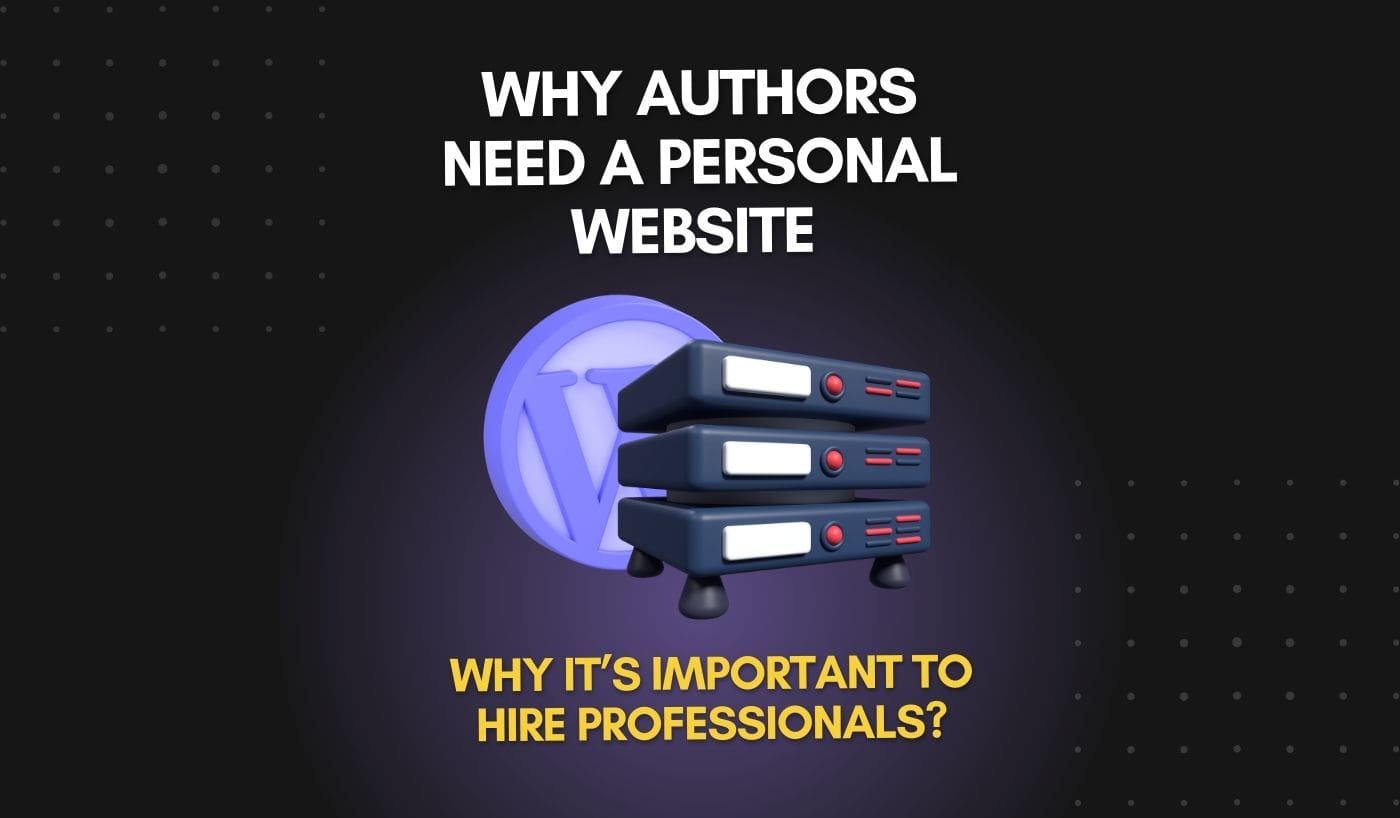Having a personal website has become increasingly important for authors in recent years. Establishing an online profile allows you to connect with readers, showcase your writing portfolio, and establish credibility in the literary world. But don’t just take our word for it; let’s look at some facts to see why authors require a personal website.
Primarily, 87% of consumers conduct online research before making a purchase decision. This means having a personal website offers a distinct advantage because it is an online hub where potential readers can learn more about their favorite authors or discover new ones.
A personal website is crucial for authors to reach a growing audience, communicate directly, build credibility, adapt to mobile browsing patterns, and gain valuable insights. So, if you’re an author trying to boost your online visibility and connect with a larger audience, a personal website is a must-have marketing tool.
Reasons Why Authors Need A Personal Website
An author may require a personal website for a variety of reasons, including the following:
1. Create a Digital Portfolio as an Author
Explore the significance of having a personal website as a digital portfolio. Discuss how it serves as a thorough presentation of an author’s body of work, giving readers and industry professionals a single point of contact for research.
How do you create a digital portfolio as an author?
- Gather and arrange your body of work, which may include novels, articles, essays, and other pieces of writing.
- Create a personal website that exhibits your work in an appealing and user-friendly manner.
- Make a separate page for each piece of work, with a brief description, cover image, and links to buy or read it.
- Include a biography and CV section that highlights your accomplishments, honors, and relevant experience.
2. Establish a Direct Connection with Your Readers
Investigate the concept of establishing a direct link with readers via an author’s website. Discuss how it acts as a direct communication route, allowing authors to communicate with their audience through blog posts, newsletters, and interactive features.
How do you establish a direct connection with your readers?
- Create a blog on your website and use it to provide updates, observations, and behind-the-scenes peeks into your writing process.
- Encourage readers to join up for your newsletter so they may receive frequent updates on new books, book signings, and promotions.
- To establish a community and engage your audience, use interactive tools such as comments, forums, or live chats.
3. Take Control of Your Story as an Author
Emphasize the value of having a personal website in shaping the narrative surrounding your work. Discuss how it enables authors to convey their tales, accomplishments, and background in their own words, independent of external platforms.
How do you take control of your story as an author?
- Create interesting and original content that represents your voice and point of view.
- Create an “About Me” page in which you identify yourself, including background information, influences, and your writing path.
- Use your website to dispel myths and bad narratives about your work, allowing you to define the narrative on your own terms.
4. Craft an Author Identity in the Digital Realm
Examine the notion of author branding and how a personal website may help to develop and reinforce that brand. Discuss how design components, color palettes, and consistent messages may help you create a memorable author identity.
How do you craft an author identity in the digital world?
- Create a consistent visual identity with a well-designed website that matches your brand.
- Select a color scheme, typeface, and visuals that are appropriate for your genre, writing style, and target audience.
- Create a unified and memorable author identity by using images and layouts that express the tone and vibe of your work.
5. Easily Manage Content and Updates
Emphasize the need for content management and regular updates. Discuss how having a personal website gives writers flexibility over when and how they release news, keeping readers up to date on the newest developments.
How do you manage content and regular updates?
- Use a simple content management system (CMS) to effortlessly update and alter your website.
- Schedule time regularly to add new material to your website, such as blog entries, book reviews, or author interviews, to keep it fresh and entertaining.
- Make your website mobile-friendly so that people may access your material across several platforms.
6. Enhanced Author Discoverability
Explain how a personal website may improve an author’s discoverability, allowing readers and industry experts to locate their work more easily. Discuss the usage of SEO tactics and the potential to exhibit published books, essays, and other works on the website.
How may a personal website improve an author’s discoverability?
- Use search engine optimization (SEO) techniques to improve your website’s visibility in search results, such as incorporating relevant keywords, meta tags, and alt text.
- Provide a detailed catalog of your published works, organized by genre, publication date, or series.
- Utilize social media integration to publish website content and attract traffic to your website.
7. Develop Credibility and a Professional Image
Discuss how a personal website might assist authors in developing a professional image and increasing their reputation. Examine the significance of having a professional and well-designed website that highlights an author’s skills and accomplishments.
Creating Credibility and a Professional Image:
- Select a professional domain name that is memorable and fits your author brand.
- Make certain that your website has a clean, modern design that is visually appealing and easy to browse.
- Include testimonials or evaluations from credible sources to demonstrate your trustworthiness and good response to your work.
8. Secure Long-Term Success & Ownership
Discuss the long-term advantages and ownership of having a personal website. Explain how authors may increase their online visibility and readership over time, as well as the benefits of having complete control and ownership over their material.
Methods to guarantee long-term success and ownership:
- Get your domain name and host your website with a trustworthy hosting company.
- Back up your website’s data and content regularly to defend against any loss or technical concerns.
- Constantly update and develop your website to keep up with current trends and technology, ensuring its durability and success.
Reiterate the significance of writers having a personal website, highlighting the primary benefits and advantages highlighted in the essay. Encourage writers to invest in creating and maintaining their online platform to expand their reach, engage with readers, and improve their professional image in the business.
Quick FAQs
Question #1. Is it worthwhile to invest in personal websites?
As an author, having a personal website is worthwhile. It gives you total control over your web presence and helps you to present your work professionally. A website acts as a primary hub that links you with your audience, gives a platform for displaying your work, and aids in the establishment of your author credentials. It also enables you to distinguish yourself from other authors and create a personal brand.
Question #2. What characteristics distinguish an excellent author website?
An excellent author’s website should be visually beautiful, user-friendly, and well-organized. It should include brief information about you as an author, such as your biography, literary accomplishments, and planned projects. To keep visitors updated and involved, a good author website should also include a blog or news section.
Question #3. Should I establish a website for my book?
Having a website devoted to your book might be advantageous, especially if you have numerous novels or a book series. A book website allows you to establish a concentrated platform where readers can discover more about that specific book, its plot, characters, and any associated assets like maps or pictures.
Question #4. Is it necessary for a self-published author to have a website?
Yes, having a website may be quite beneficial to a self-published author. Self-published writers, unlike established publishers, must actively promote and sell their books. It allows writers to highlight their books, give extracts or sample chapters, and provide information about them.
Conclusion
A personal website gives authors total control over their content and allows them to interact directly with viewers. It is a forum for sharing information about new publications, promoting events or signings, and selling items. Moreover, it also allows you to link social media networks, engaging with followers across several channels.
Moreover, a personal website is also a long-term investment in your writing career. It enables you to create an email list, allowing you to remain in touch with readers and tell them about new releases. Additionally, it permits potential agencies and publishers to learn more about you and your work while presenting a professional picture.
If you are an aspiring author who needs a portfolio website or a professional who want to sell his next best-seller , contact us today. We will develop a new website and also create book landing pages that sell.




